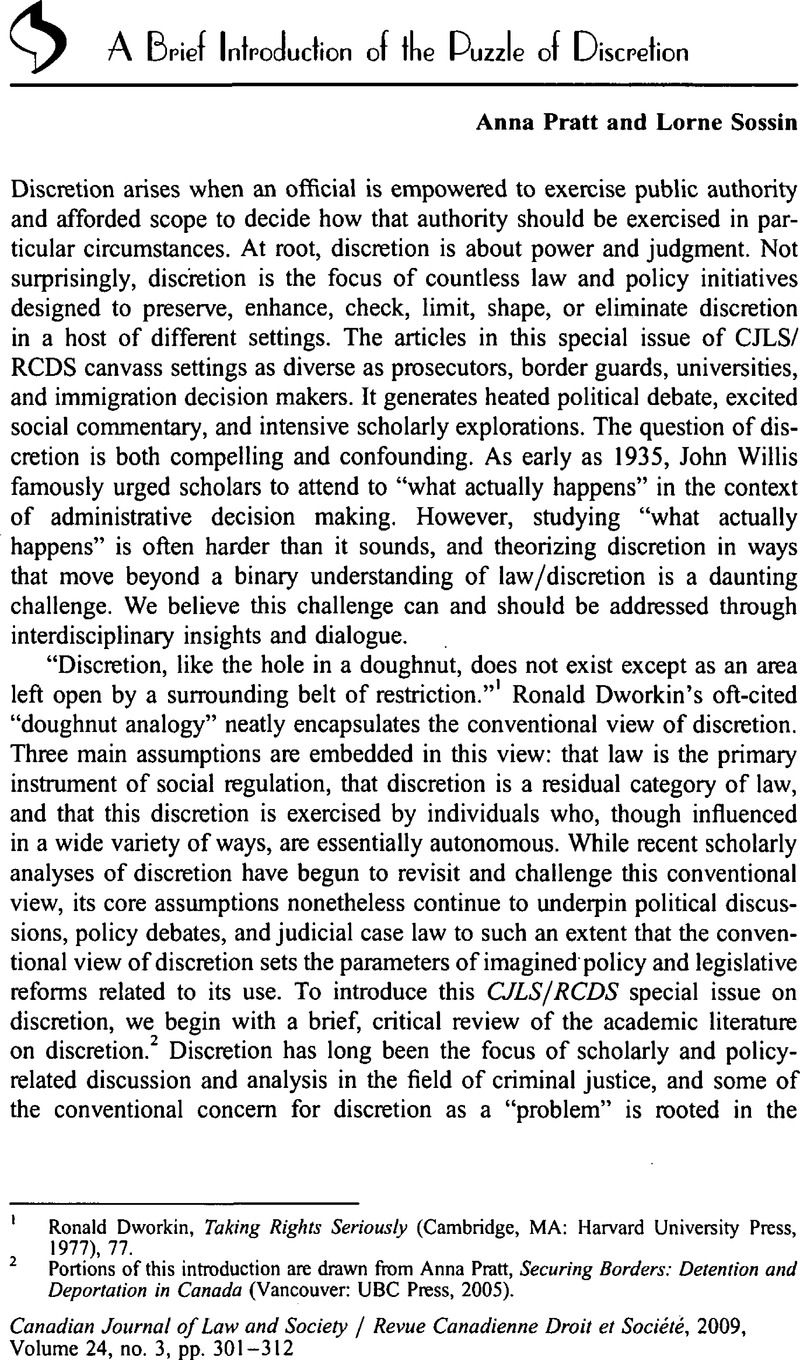Published online by Cambridge University Press: 18 July 2014

1 Dworkin, Ronald, Taking Rights Seriously (Cambridge, MA: Harvard University Press, 1977), 77Google Scholar.
2 Portions of this introduction are drawn from Pratt, Anna, Securing Borders: Detention and Deportation in Canada (Vancouver: UBC Press, 2005)Google Scholar.
3 Anisman, Philip, ed., A Catalogue of Discretionary Powers in the Revised Statutes of Canada, 1970 (Ottawa: Law Reform Commission of Canada, 1975), PrefaceGoogle Scholar.
4 Random House Dictionary of the English Language, 2nd ed. (unabridged) (New York: Random House, 1987)Google Scholar, s.v. “discretion.”
5 Ibid., s.v. “arbitrary.”
6 Dicey, A.V., Introduction to the Study of the Law of the Constitution (1915; reprint, London: Macmillan, 1975)Google Scholar.
7 See, e.g., the work of Willis, John, and especially Willis, John, “The McRuer Report: Lawyers' Values and Civil Servants' Values,” University of Toronto Law Journal 17 (1968), 357Google Scholar. See also Willis, John, “Administrative Decision and the Law: The Canadian Implications of the Franks Report,” University of Toronto Law Journal 13 (1959), 45–55CrossRefGoogle Scholar.
8 See in particular Davis, Kenneth Culp, Discretionary Justice: A Preliminary Inquiry (Baton Rouge: Louisiana State University Press, 1969)Google Scholar.
10 See, e.g., Sossin, Lorne, “The Politics of Discretion: Towards a Critical Theory of Public Administration,” Canadian Public Administration 36 (1993), 364–91CrossRefGoogle Scholar.
11 See, e.g., Pratt, Anna, “Reframing Discretion,” in Securing Borders: Detention and Deportation in Canada (Vancouver: UBC Press, 2005)Google Scholar; DeLint, Willem, “Regulating Autonomy: Police Discretion as a Problem for Training,” Canadian Journal of Criminology 40 (1998), 277–304Google Scholar.
12 [1959] S.C.R. 121. The reality, however, is that many settings of discretion are not subject to meaningful oversight. For discussion see Sossin, Lorne, “The Unfinished Project of Roncarelli: Justiciability, Discretion and the Limits of the Rule of Law” (paper prepared for The Legacy of Roncarelli v. Duplessis, 1959–2009, Université de Sherbrooke, September 18, 2009)Google Scholar.
13 Galligan, D.J., Discretionary Powers: A Legal Study of Official Discretion (Oxford: Clarendon Press, 1986), 110Google Scholar.
14 See, e.g., Loughlin, Martin, Legality and Locality: The Role of Law in Central–Local Government Relations (Oxford: Oxford University Press, 1996)CrossRefGoogle Scholar.
15 McLachlin, Beverley, “Rules and Discretion in the Governance of Canada,” Saskatchewan Law Review 56 (1992), 168Google Scholar.
16 A notable exception to this assessment is the work of John Willis. See especially Willis, , “The McRuer Report,” 357Google Scholar. See also Willis, “Administrative Decision and the Law”; Sossin, Lorne, “From Neutrality to Compassion: The Place of Civil Service Values and Legal Norms in the Exercise of Administrative Discretion,” University of Toronto Law Journal 55 (2005), 427–48CrossRefGoogle Scholar.
17 Galanter, Marc, “Adjudication, Litigation and Related Phenomena,” in Law and the Social Sciences, ed. Lipset, Leon and Wheeler, Stanton (New York: Russell Sage, 1986), 153Google Scholar.
18 Hawkins, Keith, “The Use of Legal Discretion: Perspectives from Law and Social Science,” in The Uses of Discretion, ed. Hawkins, Keith (Oxford: Clarendon Press, 1992), 19–20Google Scholar.
19 McBarnett, Doreen, Conviction: Law, the State and the Construction of Justice (London: Macmillan, 1981)CrossRefGoogle Scholar.
20 Lacey, Nicola, “The Jurisprudence of Discretion: Escaping the Legal Paradigm,” in The Uses of Discretion, ed. Hawkins, Keith (Oxford: Clarendon Press, 1992), 364Google Scholar.
21 For an excellent collection of the range of scholarly works on discretion see Hawkins, Keith, ed., The Uses of Discretion (Oxford: Clarendon Press, 1992)Google Scholar.
22 The term “rule-based conception of action” is borrowed from Shearing, Clifford and Ericson, Richard V., “Culture as Figurative Action,” British Journal of Sociology 42 (1991), 481CrossRefGoogle Scholar.
23 Handler, Joel, “Discretion: Power, Quiescence and Trust,” in The Uses of Discretion, ed. Hawkins, Keith (Oxford: Clarendon Press, 1992), 360Google Scholar. See also Handler, Joel, “Dependent People, the State, and the Modern/Postmodern Search for the Dialogic Community,” U.C.L.A. Law Review 35 (1988), 999Google Scholar.
24 Goodin, Robert. “Welfare, Rights and Discretion,” Oxford Journal of Legal Studies 6 (1986), 250CrossRefGoogle Scholar.
25 Ibid.
26 Sossin, Lorne, “Redistributing Democracy: An Inquiry into Authority, Discretion and the Possibility of Engagement in the Welfare State,” Ottawa Law Review 26 (1994), 9Google Scholar.
27 Shearing, and Ericson, , “Culture as Figurative Action,” 483Google Scholar.
28 Manning, Peter, “‘Big Bang’ Decisions: Notes on a Naturalistic Approach,” in The Uses of Discretion, ed. Hawkins, Keith (Oxford: Clarendon Press, 1992)Google Scholar; Emerson, Robert and Paley, Blair, “Organizational Horizons and Complaint Filing,” in The Uses of Discretion, ed. Hawkins, Keith (Oxford: Clarendon Press, 1992)Google Scholar; Hawkins, Keith, Law as Last Resort: Prosecution Decision-Making in a Regulating Agency (Oxford: Oxford University Press, 2003)CrossRefGoogle Scholar.
29 Fitzpatrick, Peter, The Mythology of Modern Law (London: Routledge, 1992)CrossRefGoogle Scholar.
30 Ibid., 154.
31 Ibid.
32 Lacey, , “Jurisprudence of Discretion,” 294Google Scholar.
33 Ibid., 362.
34 See, e.g., Cartier, Geneviève, “Reconceiving Discretion: From Discretion as Power to Discretion as Dialogue” (SJD thesis, University of Toronto, 2004)Google Scholar; Handler, Joel, The Conditions of Discretion: Autonomy, Community, Democracy (New York: Russell Sage, 1986)Google Scholar; Sossin, “The Politics of Discretion”; Sossin, Lorne, “An Intimate Approach to Fairness, Impartiality and Reasonableness in Administrative Law,” Queen's Law Journal 27 (2002), 809Google Scholar.
35 Pratt, Securing Borders.
36 Hawkins, Keith, “Order, Rationality and Silence: Some Reflections on Criminal Justice Decision-Making,” in Exercising Discretion: Decision-Making in the Criminal Justice System and Beyond, ed. Gelsthorpe, Loraine and Padfield, Nicola (Portland, OR: Willan Publishing, 2003), 186–219Google Scholar.
37 See, e.g., Cowan, David and Halliday, Simon, Appeal of Internal Review: Law, Administrative Justice and the (non-) emergence of disputes (London: Hart Publishing, 2003)Google Scholar; Langer, Rosanna “Defining Rights and Wrongs through Administrative Processing” (PhD dissertation, York University, 2003)Google Scholar.